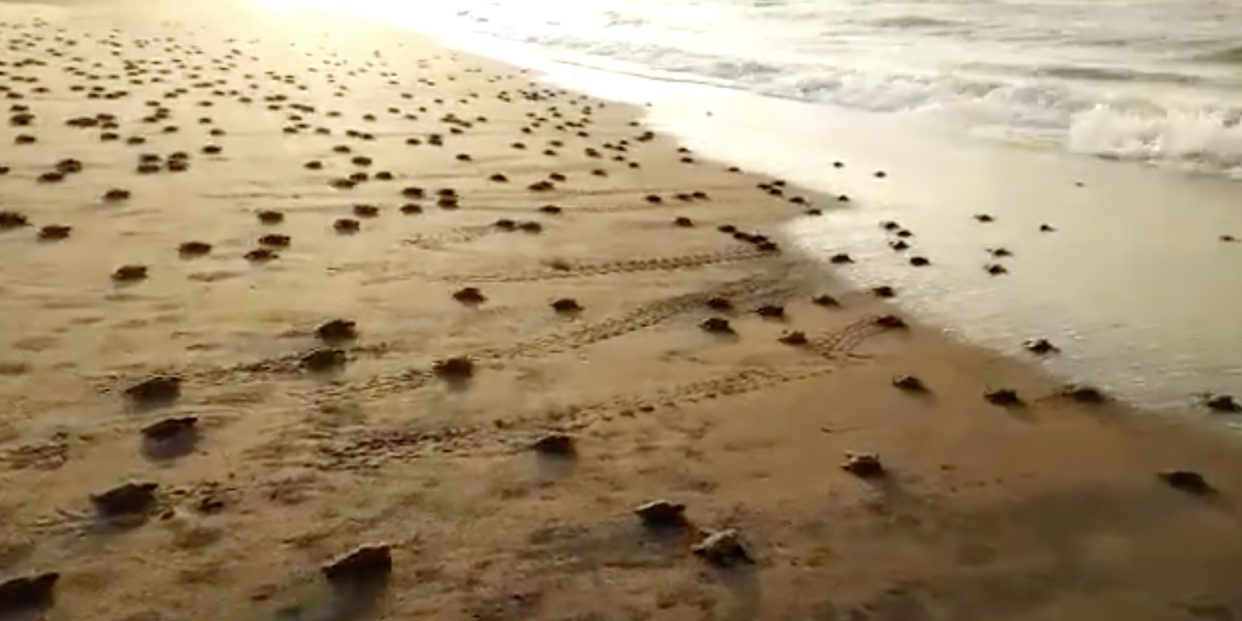Thousands of Baby Turtles Head to Sea on Empty Indian Beach, and the Videos are Magical

Olive ridley sea turtles have hatched on India’s eastern coast and were seen crossing the beach during the daytime.
Olive ridley turtles are considered endangered in Mexico, and populations are threatened globally.
Some reports speculate that India’s lockdown has helped the baby turtles thrive.
Every year, olive ridley sea turtles hatch and head to sea on India’s eastern coast, primarily in the states of Odisha and Maharashtra. But this time around, the spectacular event played out a bit differently. The baby turtles were spotted crossing the sand during daytime for the first time in nearly seven years, according to local reports.
Olive ridleys are one of the smallest sea turtle species, per Oceana, a nonprofit ocean advocacy organization. Due to human-related activity, they are considered endangered in Mexico and populations are threatened globally.
The beautiful creatures tend to make a show out of their mass nesting displays (known as arribadas—Spanish for “arrival”), which take place in Mexico, India, Nicaragua, and Costa Rica. Indian beaches are typically home to more than 500,000 of these nests annually.
A sight that casts magical spell year after year👍
Nearly 2 crore plus olive Ridley hatchlings have emerged & made their way to sea from half of about 4 lakh nesting at Nasi-2 islands, Gahirmatha rookery Odisha.
The spectacle continues. Early morning video. pic.twitter.com/C0IKTWNCko— Susanta Nanda IFS (@susantananda3) May 8, 2020
Fun fact: All female sea turtles nest on the beach where they were born. After laying up to 200 eggs in a single nest, they return to the ocean. The eggs hatch in about 50 to 60 days and the baby turtles make the journey to sea together (if they can escape predators like seabirds and crabs), per Oceana.
“The last time we saw daytime nesting of olive ridleys along this site was in 2013,” local forest officer Amlan Nayak told Mongabay-India. “Usually, they come on to the beach for nesting only during the night.”
Something to cheer.
Mass nesting by olive Ridley #turtles is one the #nature's amazing extravaganza. Millions come back to coasts & nest in group, as a protective measure. See it has started on Odisha coast today. The location is being protected by FD. via @susantananda3 sir. pic.twitter.com/BQMuUDQm0B— Parveen Kaswan, IFS (@ParveenKaswan) March 15, 2020
Many outlets have reported that the turtles are finally free to cross the beach in broad daylight because people have abandoned the area due to the coronavirus pandemic. But some local officials aren’t totally convinced, stating that it’s hard to tell what kind of impact the lockdown has had on an environmental phenomenon like this one.
Mongabay-India reported that it’s possible the lockdown helped result in a safer environment for the turtles to hatch in, due to cleaner beaches. “The advantage of lockdown was that we could divert our workforce more towards cleansing the debris on beaches and counting the nesting activities. When tourists come, part of our manpower is diverted to regulate and manage them,” Nayak said.
Whatever the reason for their daytime trek, it’s a truly marvelous sight.
Follow House Beautiful on Instagram.
You Might Also Like

